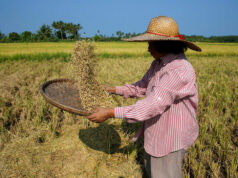
THE central bank said it is hard to estimate the impact on inflation of proposed tariff cuts on food imports, as Congress adjourns, giving the President the authority to adjust tariffs on his own while the legislature is in recess.
During a Senate hearing yesterday addressing inflation, the Bangko Sentral ng Pilipinas (BSP) said that the move to cut tariffs on selected goods will have “some incremental impact,” but it is unsure whether the impact will be significant.
“There are other aspects to the issue for fish. Is it because of the tariff?” Deputy Governor Diwa C. Guinigundo said, noting that it was difficult to quantify the effect of lower tariffs.
The Department of Finance (DoF) issued an economic bulletin last month warning that the declining fish catch will drive inflation going forward. Fish prices are politically sensitive because the poor depend on it as a low-cost source of protein. One of the proposed measures to counter this trend is to import fish more freely at lower tariffs.
Mr. Guinigundo said other things could be more significant in influencing prices like ”weather disturbances, climate change, degradation of coastal habitats, overfishing or overexploitation of fishing grounds. Second is fuel prices, which accounts for more than half of operating expenses for fishermen which rose sharply in the first half of 2018. Third is feeds (for aquaculture), which actually is about 68 to 70% of the total production cost.”
“It’s very difficult to quantify. The point that we are making is one, there are other aspects why fish prices and probably meat prices are rising. Number two, while lowering tariff duties may help, it’s an empirical question how much it is going to be of use in lowering inflation,” he told reporters after the hearing.
Senator Paolo Benigno A. Aquino IV also warned against rushing to lower tariffs while Congress is adjourned between Aug. 16 and 27. While it is in recess, the President is authorized to issue an Executive Order (EO) lowering tariffs.
He also asked whether the Executive branch can identify other measures to address supply issues to slow down inflation, such as subsidizing some input costs.
“Can’t we try to make feeds cheaper? I don’t know if that has come up. Maybe lowering tariffs isn’t the best way. We’re just worried lowering tariffs could be a knee-jerk reaction,” Mr. Aquino said during the hearing.
“We are in recess and there might be an EO. So the decision might be rushed,” he added.
Mr. Guinigundo meanwhile said that “anything that can mitigate the current situation will be useful.”
Inflation in July hit 5.7%, the highest in five years.
Trade Undersecretary Ruth B. Castelo, said that the position of the Cabinet-level Committee on Tariff and Related Matters (CTRM) is that “there’s no need to adjust tariff rates.”
“What will be needed are volume-enhancing moves from the Department of Agriculture through a department administrative order removing special safeguard measures, like the prohibition on imported fish being sold at retail and restricting its use to processors. This can be suspended to allow more supply in the public markets,” said Ms. Castelo.
“Also the utilization of minimum access volumes for chicken and pork could raise supply. We also need, to run after hoarders and traders hoarding supplies of agricultural products,” she added.
She added however that the CTRM will communicate its position to the National Economic and Development Board, chaired by President Rodrigo R. Duterte.
Agriculture Undersecretary Segfredo R. Serrano also noted that farmers will not be able to compete with lower prices from imported meat, adding that farm gate prices are actually low.
“It’s really the traders that increase the prices. For example, a kilo of carrots has a farm gate price of P7, but it’s sold in the market at P18. So why penalize farmers by allowing cheaper imports… the problem isn’t with the farmers but in the trading sector,” he added.
Preliminary DoF estimates show that a 5% tariff on imported fish and chicken will reduce government revenue by P2.8 billion, though higher import volumes may make up for the decline. — Elijah Joseph C. Tubayan



